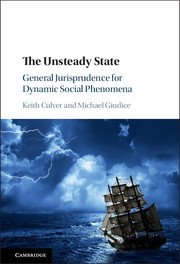
-
Select format
-
- Publisher:
- Cambridge University Press
- Publication date:
- 11 May 2017
- 30 March 2017
- ISBN:
- 9781316471203
- 9781107134805
- 9781316500842
- Dimensions:
- (228 x 152 mm)
- Weight & Pages:
- 0.51kg, 258 Pages
- Dimensions:
- (229 x 152 mm)
- Weight & Pages:
- 0.35kg, 258 Pages
- Subjects:
- Law, Legal Philosophy, Philosophy, Jurisprudence
You may already have access via personal or institutional login- Subjects:
- Law, Legal Philosophy, Philosophy, Jurisprudence
Book description
Analytical jurisprudence often proceeds with two key assumptions: that all law is either contained in or traceable back to an authorizing law-state, and that states are stable and in full control of the borders of their legal systems. What would a general theory of law be like and do if these long-standing presumptions were loosened? The Unsteady State aims to assess the possibilities by enacting a relational approach to explanation of law, exploring law's relations to the environment, security, and technology. The account provided here offers a rich and renewed perspective on the preconditions and continuity of legal order in systemic and non-systemic forms, and further supports the view that the state remains prominent yet is now less dominant in the normative lives of norm-subjects and as an object of legal theory.
Contents
Metrics
Full text views
Full text views help Loading metrics...
Loading metrics...
* Views captured on Cambridge Core between #date#. This data will be updated every 24 hours.
Usage data cannot currently be displayed.
Accessibility standard: Unknown
Why this information is here
This section outlines the accessibility features of this content - including support for screen readers, full keyboard navigation and high-contrast display options. This may not be relevant for you.
Accessibility Information
Accessibility compliance for the PDF of this book is currently unknown and may be updated in the future.


